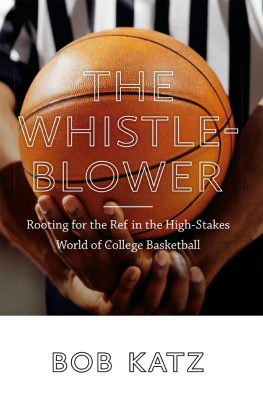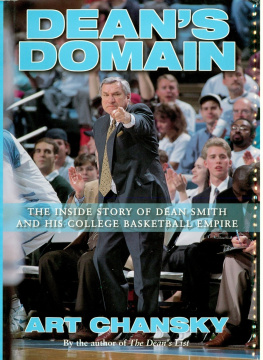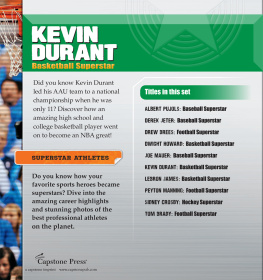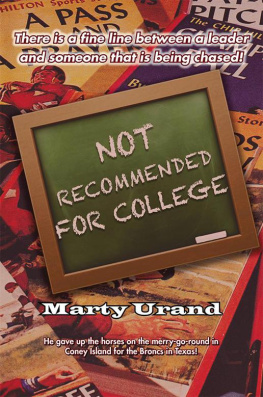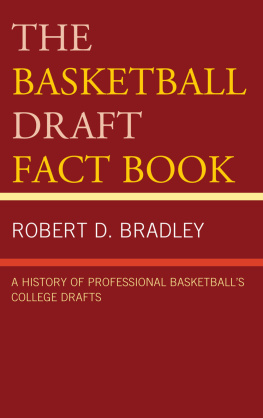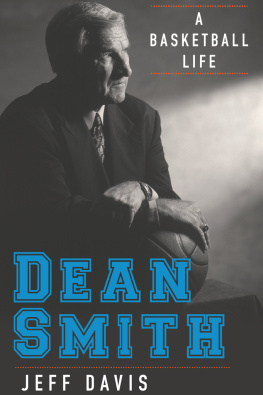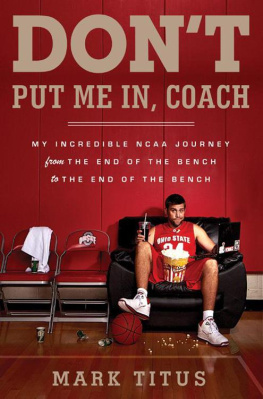Bob Katz - The Whistleblower: Rooting for the Ref in the High-Stakes World of College Basketball
Here you can read online Bob Katz - The Whistleblower: Rooting for the Ref in the High-Stakes World of College Basketball full text of the book (entire story) in english for free. Download pdf and epub, get meaning, cover and reviews about this ebook. year: 2015, publisher: ForeEdge from University Press of New England, genre: Romance novel. Description of the work, (preface) as well as reviews are available. Best literature library LitArk.com created for fans of good reading and offers a wide selection of genres:
Romance novel
Science fiction
Adventure
Detective
Science
History
Home and family
Prose
Art
Politics
Computer
Non-fiction
Religion
Business
Children
Humor
Choose a favorite category and find really read worthwhile books. Enjoy immersion in the world of imagination, feel the emotions of the characters or learn something new for yourself, make an fascinating discovery.
- Book:The Whistleblower: Rooting for the Ref in the High-Stakes World of College Basketball
- Author:
- Publisher:ForeEdge from University Press of New England
- Genre:
- Year:2015
- Rating:4 / 5
- Favourites:Add to favourites
- Your mark:
- 80
- 1
- 2
- 3
- 4
- 5
The Whistleblower: Rooting for the Ref in the High-Stakes World of College Basketball: summary, description and annotation
We offer to read an annotation, description, summary or preface (depends on what the author of the book "The Whistleblower: Rooting for the Ref in the High-Stakes World of College Basketball" wrote himself). If you haven't found the necessary information about the book — write in the comments, we will try to find it.
A riveting tour of college basketball, guided by an unlikely sports hero: the referee
Bob Katz: author's other books
Who wrote The Whistleblower: Rooting for the Ref in the High-Stakes World of College Basketball? Find out the surname, the name of the author of the book and a list of all author's works by series.
The Whistleblower: Rooting for the Ref in the High-Stakes World of College Basketball — read online for free the complete book (whole text) full work
Below is the text of the book, divided by pages. System saving the place of the last page read, allows you to conveniently read the book "The Whistleblower: Rooting for the Ref in the High-Stakes World of College Basketball" online for free, without having to search again every time where you left off. Put a bookmark, and you can go to the page where you finished reading at any time.
Font size:
Interval:
Bookmark:

THE WHISTLEBLOWER
Rooting for the Ref in the High-Stakes
World of College Basketball
BOB KATZ
ForeEdge
ACKNOWLEDGMENTS
In the course of researching this book I spoke with a number of working referees whose names do not appear in the preceding chapters because they preferred not to be identified. There is a general belief among referees that, like behind-the-scenes diplomats engaged in back-channel negotiations, they can be most successful in their mission if they are not perceived as desiring any personal attention beyond what is, by the nature of their work, unavoidable. The call not to be quoted or cited was entirely theirs, and I will not challenge it.
Except to say, this preference for relative anonymity, surely an anomaly in our age of rampant self-promotion, is a characteristic so admirable on the face of it Im tempted to single them out and salute them simply for that impulse alone. But I wont.
First and foremost, I am grateful to Ed Hightower. He made time in his demanding schedule for my inquiries and used his influence, in ways that occasionally inconvenienced him, to get me a box seat for some of the action.
Members of the Hightower family were gracious with their recollections. Eds wife, Barbara, his mother, Daisy, his daughters, Jennifer and Julie, and three of his brothers, Clarence, Calvin, and Robert, were all helpful. Each in their own way told me details that proved useful and revealing. Just as importantly, the keen intelligence and generosity of spirit that infused their conversation reinforced my impression of an extraordinary family rooted in exceptional values.
Lee Stevens, a basketball aficionado who is also a product of the pre-civil-rights-era Missouri Bootheel region, escorted me to a Buckeyes game in Columbus and enlightened me about Ed Hightower and the art of officiating. It was Lee who confided that he primarily watches the refs when he watches a college basketball game. Learning this encouraged me to think that, with his tutelage, I might give it a try.
Doug Wilhide, poet, essayist, and friend from an undergraduate experience that included both the writing seminar that first encouraged me to take it, as the pros say, to the next level, and an erratic intramural basketball team that occasionally let me shoot, reviewed a draft of the manuscript and contributed many worthy suggestions. His notes to me in the loose-leaf margins, hand-scrawled in no. 2 pencil, were often as difficult to decipher as a doctors prescription, and just as welcome. Even when I failed to solve the mystery of exactly what Doug had written, I felt I was sufficiently familiar with his editorial preferences to make the corrections I figured he was suggesting.
Will Anderson, a historian by instinct and a college basketball fan (Badgers) by compulsion, provided research assistance that, fortunate for me, was coupled with valuable insights. Louis Katz helped with research and served as a contrarian sounding board on a few matters that properly did not make the final cut.
Several friends provided the kind of companionable conversations that allowed me to incubate and sharpen my thoughts about this book, and granted tacit permission to slyly annex a few of their thoughts as well. In particular, Martin Lee, Jeff Cohen, and Doug Melton at various stages helped me recognize what was most interesting about this material, and helped me clarify ways to spell it out. Norman Zamcheck, who knows next to nothing about sports, was nonetheless, and perhaps for that very reason, a source of enlightened feedback.
Thanks also to Stephen Hull at University Press of New England who recognized that this project had merit and gave me the opportunity to bring it to fruition. His editorial suggestions were wise and invariably strengthened the manuscript.
Lastly, I want to thank my wife, Mary, and my sons, Louis and Daniel, for their understanding and support.
THE ONE WE WANT ON THE ROAD
The first nationally televised college basketball game Ed Hightower ever refereed was Michigan State versus the University of Iowa, in Iowa City on January 5, 1983. He was thirty-one years old and just beginning to work his way into a regular rotation of choice assignments in brand-name conferences like the Big Ten and the Missouri Valley Conference. An ebullient man with a welterweights compressed muscularity, hed come up the hard way harder than almost anyone could imagine and it pleased him to know that friends and family back in southern Illinois could tune in to watch him work. At least someone would be rooting for him.
All sporting contests are to some extent a stage, and theres nothing quite like national TV coverage to emphasize this point. Players like to say they just ignore the extra attention, and more power to them if they actually manage to do so. Top-tier coaches, like skilled actors, know precisely where the camera is and how to play to it. As for the referees, well, nobody much likes to consider what theyre thinking since the whole experience of organized sports is neater, cleaner, and infinitely more palatable if the referees can be altogether ignored. In a perfect world, they might not even be needed.
The game was hard fought throughout. Michigan State was one of the nations top teams and featured three athletes Sam Vincent, Scott Skiles, and Kevin Willis who would go on to careers in the NBA. Iowa, led by future pros Bobby Hansen and Greg Stokes, kept the game close. The pace was fast and furious, yet Hightower had no difficulty keeping up: the elite-conference supervisors whod finally begun assigning him some important games understood that his promising set of skills included the ability to run, to really flat-out run. Although never a star in his own playing days, Hightower retained an athletes capacity to accelerate without warning, maybe not always quickly enough to match the swiftness of a nimble guard speeding away with a steal but fast enough, when combined with shrewd anticipation of the plausible patterns of developing plays, and the implausible ones as well, to arrive in the nick of time at the optimal vantage point. Players hustle to beat their man down court; refs hustle to get properly positioned for whatever happens next.
Hightower was certainly not one to be left lagging. A driven man with a ferocious work ethic, he was keenly aware there were no guarantees in this profession and plenty of potential pitfalls. It had been several years getting this far. The path to advancement in basketball officiating parallels that of other professions. The lower rungs are denoted by grade-school and rec-league games in under-heated gyms with nobody but a handful of rankled parents watching. The next steps involve working high school and lower-level college contests where the pace and pressure quicken. Any flaw in an officials skill set, be it temperament or judgment or the intangible aptitude for managing the mayhem, soon gets exposed. The top rung consists of working marquee matchups between Division 1 teams in elite conferences. These assignments pose greater levels of difficulty and promise greater rewards, including compensation and prestige. Successfully ascending the officiating ladder involves all the elements that contribute to success in other fields talent, dedication, perseverance, ambition, timing, and a certain amount of luck.
Prior to the 1983 season, Hightower had been refereeing junior colleges in Illinois and Missouri. Those assignments had been a distinct upgrade from the high school contests hed been working previously in the basketball-crazed towns on the Illinois side of the Mississippi River, towns like Belleville, Alton, Collinsville, East St. Louis, and Granite City. Until this season, his officiating career had been spent entirely in dimly lit, under-heated, claustrophobic gyms that rarely seated more than a few hundred. None of the games in those venues were televised.
Font size:
Interval:
Bookmark:
Similar books «The Whistleblower: Rooting for the Ref in the High-Stakes World of College Basketball»
Look at similar books to The Whistleblower: Rooting for the Ref in the High-Stakes World of College Basketball. We have selected literature similar in name and meaning in the hope of providing readers with more options to find new, interesting, not yet read works.
Discussion, reviews of the book The Whistleblower: Rooting for the Ref in the High-Stakes World of College Basketball and just readers' own opinions. Leave your comments, write what you think about the work, its meaning or the main characters. Specify what exactly you liked and what you didn't like, and why you think so.

